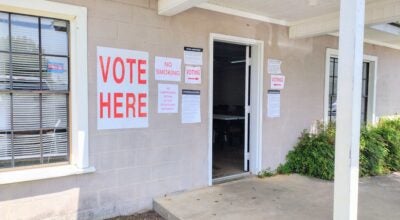English rose blooms in Butler County
Published 4:10 pm Friday, April 2, 2010
She’s traveled a long way from her birthplace. But Olga Morton has found contentment in the cozy stone house on the Ridge in northern Butler County.
Morton originally hails from the city of Leeds in Yorkshire, England. Growing up between the two world wars, she didn’t have an easy childhood.
“My mother and father were publicans. We moved around a great deal as my father bought new businesses. They’d just get to know me well at one school when it would be time to move to a new one,” Morton recalls in her lilting Yorkshire accent.
At age 14, she went to work, serving as a junior in the children’s department of a high-class department store, enjoying the atmosphere, if not the low pay.
When WW II began in 1939, Morton was too young to be in the forces. But she very much wanted to serve her country. “I joined the Women’s Land Army (WLA) to help the farmers out. I actually lied about my age to get in; I was just 16. My parents both tried to stop me,” she says.
But the independent-minded girl was determined to go her own way.
The new “Land Girl,” as the WLA members were called, was sent to the village of Lacock in Wiltshire.
Morton milked cows, cleaned stalls, trimmed hedges, helped with hay cutting and the birthing of several baby calves.
“One of the cows with horns turned suddenly one day, and almost took my eye out. I still have a scar. And another time I had a runaway horse to deal with,” she says.
It was hard and dirty work. “But it was also one of the happiest periods of my life, too,” she recalls.
“We had a lively time. And the forces used to come and help us during haymaking time. Actually, I think the boys caused more havoc than help, but we had fun.”
While the WLA made a valuable contribution to Britain by keeping the farms operating, “we never were really recognized for it,” Morton says.
The British government is finally making amends for their neglect of the Land Girls.
“A few weeks ago, I got a medal in the post along with a letter signed by the prime minister commending me for my wartime contributions,” she says.
Morton and husband Herbert, a retired Navy officer, actually met in 1991 at a concert at St. Martin-in-the-Fields Church in London, where Morton was employed.
“We just happened to sit next to each other and struck up a conversation. He was on leave but said he would write to me – and he did,” she recalls.
That began seven years of transatlantic correspondence with occasional visits.
During one of her visits to the Ridge, Herbert popped the question during a walk through the countryside.
The couple married in 1998. “He is the best thing that has ever happened to me,” she says simply.
Undergoing treatment for cancer for the past several years hasn’t been easy. But her discovery of a new passion for painting religious icons has brought her comfort through difficult times.
“I was quite surprised at how well I did. But I realize it was the hand of God working through me,” Olga Morton says.
Today she and Herbert share their idyllic country home with four former stray canines. She stays in touch with her children from her first marriage and their families via email.
“You never know what life will bring. But I can say I am living better than I’ve ever lived with Herbert on the Ridge.”




